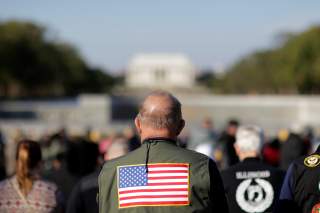America's Darwinian Nationalism
While other states have survived and even prospered by a ruthless realpolitik of sorts, America, because it was born as a geographic bounty and also as an ideal, is nothing without both.
WARFARE IS inherent to the human condition. Postmodern war—combining conventional, cyber, informational and perhaps even advanced, low-fallout nuclear weapons—will not be confined to where and what we want it to be. Connectivity will allow regional conflicts to quickly migrate. The realm of cyberwar—from hacking to ransomware to large-scale document theft—shows that rather than having evolved, human nature is as perverse, aggressive and malicious as ever. The very lack of face-to-face interaction intensifies cruelty. One no longer has to be brave or even face consequences to inflict pain on others. Future war will have the ability to demoralize us without physically killing us. Such is war in a confined space, where even countries the size of continents will soon face a crisis of room.
But we face another crisis: what is it, exactly, that we will fight for? This may seem like a preposterous question. After all, we are Americans. We have a homeland and a storied geography. But as technology shrinks distance, and our airports become mere bus stations, fewer and fewer Americans are aware of this geography. Moreover, Wilsonianism has been a purely elite project at a time when elites’ political prestige is under great stress. In the meantime, the professionalization of the military goes on, creating a soldiery that has an esprit de corps increasingly removed from the citizenry itself. The crises around the world that daily obsess the Pentagon and policy elites have little resonance beyond certain zip codes, until violence of some form knocks at our door.
What this all means is that Trump’s America First strategy, if it does not evolve in the direction of Wilsonianism, actually represents the swan song of American nationalism and foreign policy, rather than their renewal, and that what follows could be further division, not unity.
Robert D. Kaplan is a senior fellow at the Center for a New American Security and a senior adviser at Eurasia Group. He is the author of The Return of Marco Polo’s World: War, Strategy, and American Interests in the Twenty-first Century, to be published next year.
Image: Veterans attend Memorial day services at the World War II Memorial in Washington, U.S., November 11, 2016. REUTERS/Joshua Roberts

